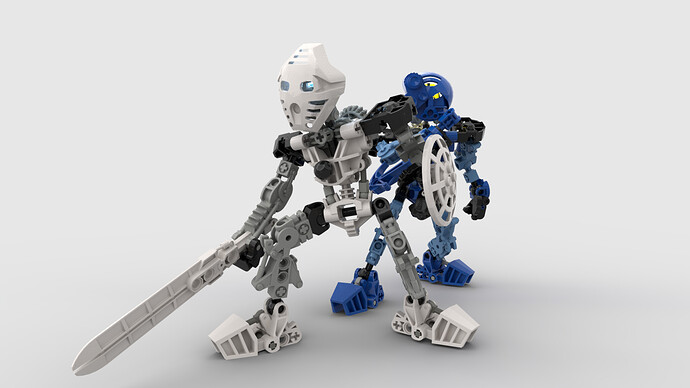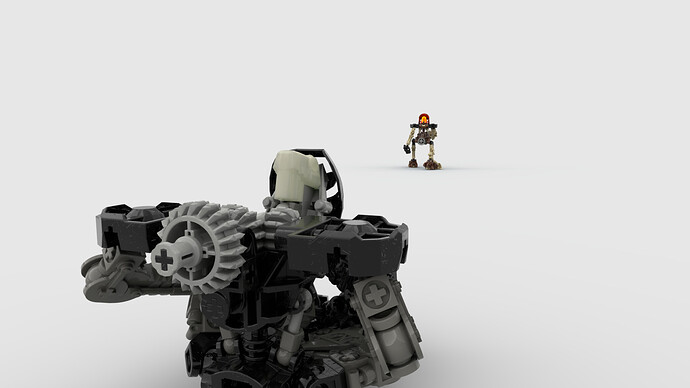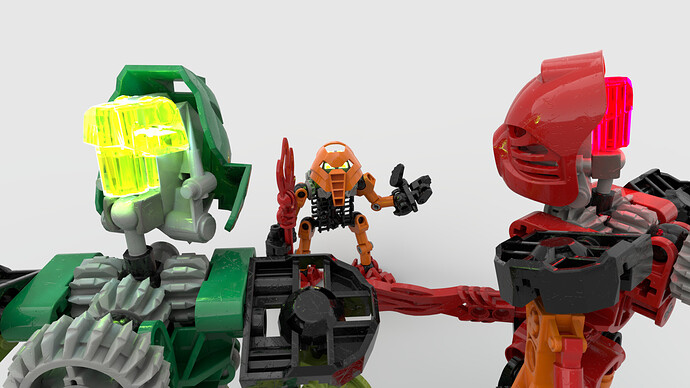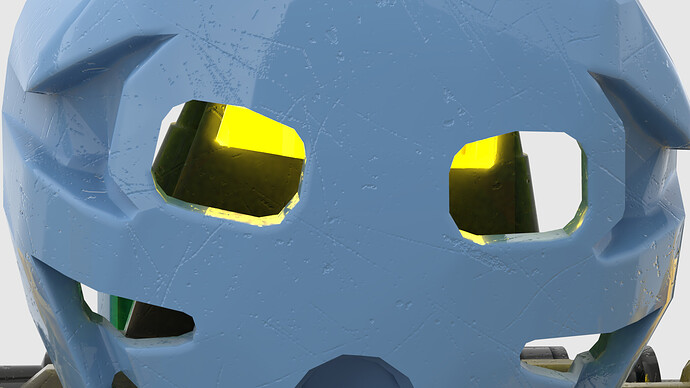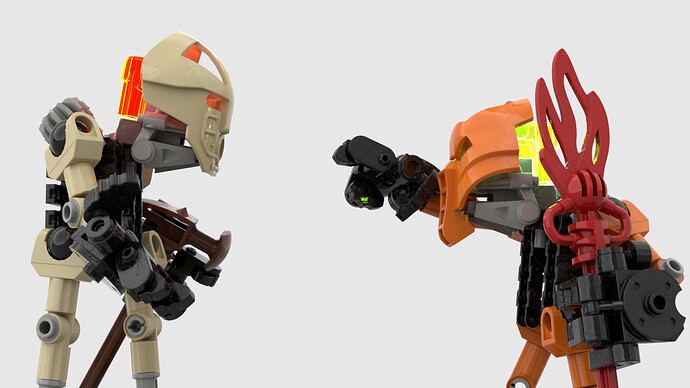This is a mirror of a story posted to Archive of Our Own.
Chapter One: The Meeting
The underbrush cracked and broke as a tall, red-armored warrior stalked through it. He knew not how long he had walked - a minute? An hour? A week? Come to think of it, he didn’t know what any of those things even were. He knew only two things for certain: his name was Tahu, and he controlled the flames.
He turned. Over his shoulder, he could see his fires licking the corpses of fallen trees, consuming the dry grasses and ferns, parting the overhead canopy. This was more like it! It was too dark in this jungle. Tahu needed to see the sun, feel its warmth on his mask. He cut a swath through the trees, his path revealed by a tower of smoke, climbing on the updrafts.
Atop a mountain peak, the snows shifted. Something stirred beneath the frost, rising, casting off the ice in chunks. It straightened its limbs ponderously, testing the limits of the mechanical joints connecting its organic muscle tissue. Its eyes opened, blue light streaming through the eyeholes of its mask. It huffed, cold seeping through its white metal armor. It was re-energized now.
It stood up fully straight, extending an arm, at the end of which was mounted a long, flat sword. Extricating its feet now from the drifts, it stepped to the edge of the cliff, and leapt. A beam of ice shot forth from the tip of the sword, coursing straight down, building a ramp of ice. The white warrior now unlimbered a shield from its back, tossing it to the ramp, and landing hard with both feet before pushing off, riding the slick surface of the ramp down the face of the cliff.
I am Kopaka, he thought. I control the frost.
When the black-armored being that knew his name to be Onua awoke, he was stranded on a bare, sandy beach. The ground was flat and extended for miles along the shore; the sky was dwarfingly massive and cloudless, the sun staring down at his tiny shape amid the waves. Onua’s first instinct: get out of the light. He looked down at his hands - six fingers, each ending in a long, sharp, curved claw, made for pushing soil. He did what his mind demanded: he dug.
Now, Onua was many feet below the ground, his shovel-like claws carving out a tunnel through the ground, scooping dirt out from in front of himself and pushing it behind him. His weak, white eyes were well-adjusted for the dark, and he moved through the underground as though he was made to. In fact, he was made to. Aside from his own name, all that Onua knew was that he controlled the earth.
Two broad hands placed a stone atop a cairn. Carefully, it was adjusted, made to balance perfectly on its narrow end. The broad, brown mask of the one who knew his name to be Pohatu studied the stone, watched it sway gently as it attained balance. In one decisive movement, he pushed the top of the stone with one finger, tipping the entire stack to the ground. His mask, forged into the shape of a wicked grin, began to glow.
The fallen rocks of the cairn began to float slowly into the air, the effects of gravity disappearing. Pohatu reached out and manipulated them, sending them orbiting around his body as he crossed his legs and sat. He, too, began to float, closing his orange eyes and meditating. There were two thoughts in his mind: his name, and his purpose; Pohatu, who controlled the rocks.
A blue-armored warrior moved through the water, kicking with a regular rhythm, deftly swiping like a knife through the clear sea. Her yellow eyes scanned the seafloor, examining reefs, sea plants, and fish, who scattered in fear at her approach. The myriad telescopic lenses attached to her mask articulated, zooming, retracting, extending, examining independently all of the sights she consumed.
I am Gali, she thought, and I control the water. She mustered a current that pushed her forward, over a deep trench. Within, she could see monstrous marine reptiles, their sick eyes glowing in the dark of the water. She passed over, then turned upright, her mask inches from the surface. On the shore, she could see squat figures moving about, their armor the same shade of blue as her own.
For some time now, Lewa had been tracking a conspicuous quarry. He knew how to move through the jungle, unlike his brash target, who was out of place not only in the way he crashed, fell, and burned his way through the foliage, but also in the bright red armor he wore, making him stand out as much as Lewa thought possible.
Well, that, and all the fire, Lewa thought.
Indeed, as much time as Lewa had spent following the red-armored being he was tracking, he had also been attempting to extinguish the raging forest fires that his target was intent on starting. Whenever he encountered an obstacle, the fire-warrior would raise his sword, forged in the shape of a flame, and a fire would erupt, clearing his path. The being would step through, unharmed, while Lewa was left behind to extinguish it.
Lucky for me, I control the wind, Lewa thought, conjuring a gust powerful enough to choke the flames before they spread further.
Lewa didn’t know where his target was going; in fact, as he would come to find out, neither did Tahu. He wandered aimlessly, merely taking a path inward from where he awoke on the shore. It was by sheer coincidence that the spirit of Air had encountered Tahu and decided to tail him. He was beginning to wonder if he should stop the arsonist before he did any real damage.
I know what I shall do, Lewa thought, his bullet-shaped mask beginning to glow. I shall trap him. In a flash, he disappeared, moving at near-incomprehensible speed through the trees. He swung from vines, leaping from branch to branch, and eventually he crested the canopy, skipping along the tops of the trees. Once he had passed the red warrior at a distance he considered safe, he dropped back down to the ground, and began fashioning his trap.
Tahu was beginning to get frustrated. Where was he going? Why was he doing this? Where even was he?
When he awoke, he was on a beach. He was immensely weakened; he looked down at his body, and it was grey. He crawled along the sand until he encountered a mask. Its mouth was open wide in a yell of power, its eyes were set and stern. Its cheeks were lined with what looked like gills.
Donning the mask, Tahu felt power return to his body; he could finally stand and get a look at his surroundings. The color returned to his metal skin. One of the first things he saw was a sword embedded in the sand near where he woke up. Its crimson blade was shaped like a flame. When he grabbed it, the tip of the sword heated until the sand it was stuck in became glass, and then fully melted away.
He swiped the sword through the air, curls of flame erupting. I could get used to this, he thought.
Now, Tahu was using the mighty power of his sword - and his body - to cut his way through the jungle. He still was unsure of where he was going, but now, ahead, he heard a strange sound. A thick, repeating thud… thud… thud. Now he knew where he was going - he would see what made that noise.
Ahead, the jungle began to thin, and opened into a clearing. He thanked his luck that he found an area so easy to navigate. Stepping out into the warm sun, a smile spread behind Tahu’s mask.
Suddenly, the trees around him came crashing down. In an instant, he was boxed in by a prison made of fallen logs. Tahu roared in anger as his sword erupted into an inferno.
“Who goeth there?,” he yelled, his voice as yet unutilized.
Lewa heard the yell of the red warrior as his trap was sprung. Swinging his hatchet, he felled a final tree - this one aimed squarely for the red warrior’s form at the center of the clearing.
Tahu turned and saw a falling tree bearing down on him. Suddenly, before it could collide with him, his mask began to glow, and a translucent barrier appeared around him. The tree slammed into the sphere of energy, ripples spreading across its surface as the bark splintered and shattered, the entire tree reduced to woodchips in an instant. Tahu yelled again. “Show thyself, assailant!” He swung his sword now, setting fire to the walls that held him in.
A wind began to form. In fact, it was more than just a wind; in an instant, a gale was whipping through the clearing, buffeting Tahu until he fell to the dirt. his flames extinguishing under the pressure. Tahu fought to return to his feet, carving a gap through the logs with his sword that he could pass through.
Having now escaped the trap, he scanned the clearing, the gale still bearing down on him. He noticed movement in the treeline - a warrior in green camouflage moving between the trunks and bushes. Averting his eyes, Tahu planted his sword in the ground to steady himself against the wind. I’m being studied, he thought, grimacing. He tracked his attacker, who picked his way around the clearing’s edge. If I can wait, he will be downwind of me in but a moment. Then, I will make my counterattack.
Lewa, careful to keep himself just within the trees, moved around to where the red warrior now kneeled. The wind had felled him more than once at this point - not much longer until he would surrender. And then my jungle will be safe, Lewa thought with not the least bit of satisfaction.
He was close enough to study his features now. The red warrior’s mask was in the shape of a fearsome battle cry, an intense glare giving his face severity. Behind the mask, though, he was clearly in distress. His pink eyes were clenched with effort, his body tense. The end of his sword was buried in the ground to steady himself.
Thy flames shalt bend to the force of my winds, Lewa thought triumphantly, increasing the force of the gale. He saw a flash in the warrior’s eye - what was that?
All of a sudden, the warrior was up, his sword extracted from the soil, his entire body having made liftoff from the ground. He rode the wind, his foot outstretched, connecting squarely with Lewa’s chest and bowling him to the forest floor. The breath was knocked from his lungs.
“Speak thy name,” growled the red warrior, levelling his flaming sword at Lewa’s throat, boot planted firmly on his chest. “Perhaps I shall spare thee.”
Lewa, gasping and spluttering, raised the handle of his axe to cover his face. “Wait, wait!,” he managed, heaving for breath. The red one stepped back, removing his foot from Lewa’s chest. Lewa rolled over, propping himself on his elbows and knees, taking long, deep breaths. He began to stand, but the heat he suddenly felt at the back of his neck told him to stop.
“Stay. Who art thou? Wherefore hast thou attackedst me?”
Lewa raised his hands, palms open. “I don’t know thee. I merely wished to find out!”
“By killing me?”
“N-no, I-”
“Enough.” Another voice rang out, and both warriors’ attentions were drawn to the air above them.
Standing on a pillar of ice was a newcomer, one who looked like them except for the blinding white of his armor. He brandished a sword and a shield. His mask was wide and tall, octagonal, lined with vents.
“I know not either of ye, but I sense a kinship between us,” he continued. “Look upon our bodies; we are the same in construction.” He extended an arm, flexing his fingers, before swiping his sword through the air, sending a shower of snow over the two in the clearing. It sizzled and steamed when it touched the red one’s sword.
Lewa was allowed to stand as the red warrior withdrew his sword. The white one created a staircase of ice, which he walked down to enter the clearing.
“If I am correct, I believe thine experiences will be similar to mine,” the white one spoke as he approached Lewa and his quarry. He sheathed his sword and stowed his shield. “I know not whence I came, but I know my name - Kopaka. And I know that I control the frost, the ice, the snow, and the cold.”
The red one nodded. “I am Tahu,” he spoke. “I control the heat and flames.” His voice had softened.
“I am Lewa,” Lewa said. “I control the wind and air. And I believe that this is my home,” he said, gesturing to the trees around them. “Wherefore I attacked thee, Tahu.” He pointed an accusatory finger at the red-armored warrior.
Tahu opened his mouth to speak, but Kopaka intervened. “Allow the past to pass, Tahu. May I call thee brother?”
Tahu stayed silent. He glanced between Kopaka and Lewa.
“Then never mind.” Kopaka turned to face his pillar of ice, which was beginning to melt in the sun. “If none of us know wherefore we are here, then we mote discover the purpose. When I awoke, I climbed yonder mountains, and when I made that trek I saw a vast volcano. Perhaps that is thy home, Tahu. It would do thee good to seek it.”
Tahu nodded, stepping forward, placing a hand on Kopaka’s shoulder. “Thank thee,” he said after a long pause. “…Brother Kopaka.” He turned to Lewa and nodded, before walking off in the direction Kopaka indicated.
“Be careful!,” Lewa said, trailing him for a few steps. “Do not destroy my forest any further!”
But Tahu was gone. Lewa turned to Kopaka, who was reinforcing the ice walkway he had created.
“My home is in the mountains, amidst the ice and snow,” Kopaka said, without turning to look at Lewa. Thy home - I saw it, in this very jungle, as I was exploring.” Lewa raised an eyebrow behind his mask.
Kopaka, having mounted the steps, turned and stretched a hand out to Lewa. “Come with me,” he said. “I shall take thou thither. Just be careful not to slip.”
Chapter Two: The Legend
Gali was seated at the head of a long table, in the center of a low, domed hut fashioned from lily pads. When she had surfaced at the shore, she had startled the sailors who had taken a break on that beach from their patrol.
“Who art thou?,” she had asked, emerging from the water. “Where am I?” They brandished their tridents, Gali raising her hook-dagger.
After recovering from their initial shock, she was brought back to their home - the village of Ga-Koro, located in a vast bay. Waterfalls cascaded down the cliff faces, a rainbow perpetually carving through the spray. Ga-Koro itself was built atop floating lily pads, connected by various bridges and walkways. The homes were fashioned from plant material as well, with many of them having openings cut into the floor to afford access to the water.
When their boat landed, Gali was worshipped from the moment she stepped off. The short, blue-armored beings that lived there - the ones known as Matoran - prostrated themselves in front of her, bowing on either side as she walked onto the floating village. Gali looked between the rows of grovelling Matoran, and then up to the end of the bridge, where one who was clearly the elder stood.
Now, Gali was in the elder’s hut. She called herself Turaga Nokama. A few aides bustled about the single-room dwelling, serving fresh-caught fish and dried seaweed on carved wooden plates. Gali tasted the dishes, Nokama standing nearby, studying the warrior’s face.
“We have been waiting for you for a very long time, Toa Gali,” Nokama said, after some time.
“Toa,” Gali repeated, the word rolling out of her mouth smoothly and easily. “Toa Gali.”
Nokama nodded. Then, an expression of worry crossed her face. “Do you not remember?”
Gali paused, cocking her head. “Remember?”
“Oh, no…” Nokama shook her head, a hand going to her forehead. She crossed the room, leaning on her trident. “Kotu,” she called to a nearby Matoran, whose elliptical, ridged mask matched the Turaga’s own. “Please fetch Nixie,” she said quietly, putting a hand on the Matoran’s back and sending her off.
“What is the matter, Turaga?,” Gali asked, when the elder turned around.
“Gali, Your Majesty, I fear something has gone… amiss.”
Gali recoiled internally at the honorific. “What dost thou meanst?,” she spoke, after a short silence that felt very long indeed.
“Nixie will help me explain,” Nokama said, as the aforementioned Matoran entered the room.
Once the table was cleared, Nixie had unrolled a star chart drawn on a large leaf in black ink. Nokama spoke. “In the time before time, when our ancestors arrived on the island of Mata Nui, we were guaranteed the protection of the Great Spirit’s light.”
Gali’s eyes moved between the chart and the Turaga. Nokama seemed to be rapt, deep in concentration as she spoke. Beads of water appeared on the leaf, drawing together into the outline of what must have been the island.
“But the Great Spirit’s protection would not last. The shadow of the Makuta, which we prayed to be delivered from, was cast over our island home, and the Great Spirit was sent to sleep.” Nokama reached out and dropped a handful of black ash over the chart, scattering it into the watery shape of the island. “The Rahi turned on us, controlled by masks infected with shadow. What was once our safe haven became a land of constant danger.”
The shape of the island accreted into a sphere now, floating over the star chart.
“We called upon the Great Spirit to send us help - six heroes of legend, the Toa, avatars of the six elements, and messengers of the Great Spirit himself.” Six droplets of water appeared in the air around the central globe, and fell into it.
Gali’s eyes lit up. She smiled.
“Something has gone wrong, though,” Nokama said, her expression darkening.
“The stars foretold your arrival,” Nixie said, stepping up to the table, indicating six stars orbiting one illustrated in red. “But they foretold it many, many years ago.”
“How long were ye waiting?,” Gali asked, apprehensively.
There was a pause. Nokama spoke: “One hundred years.” She looked crestfallen.
Gali shot to her feet. “What?!” The chair she had sat in fell back.
“Toa Gali, Your Majesty, please!,” Nokama said, gesturing with her hands for Gali to calm down. The floating globe of water fell to the table, splattering over the three occupants of the hut.
“I cannot help but feel that I failed ye,” Gali spoke quietly.
“It wasn’t your fault,” Nokama reassured.
“It was the influence of the Makuta,” Nixie said, indicating a seemingly-unrelated set of stars. “The Great Spirit told us!”
“And it seems the Makuta stole your memories,” Nokama said, reaching up to touch Gali’s mask. The lenses focused as she looked down at Nokama. “You do not recall your mission at all?”
Gali shook her head, saying nothing.
Nokama turned, returning her focus to the water on the table. It re-coalesced, forming the shape of the island of Mata Nui once again.
“Scattered around our island, hidden long ago by heroes of old, are Great Masks of Power - Kanohi.” Six needle-thin pillars of water rose from disparate points on the map; then, nearly-innumerable more. “You and your five brothers must learn to control your elements, and collect these Masks of Power, in order to reach your full potential, and stop the Makuta.”
“But… I don’t know if I can,” Gali said.
“Not alone, you cannot,” Nokama said sharply, standing up straight and stamping the butt of her trident on the floor. “But together, united, you can.” The water rose again as a globe, slowly levitating towards Gali’s mask. It split now, into three smaller orbs.
“The Matoran hold three Virtues near and dear to their heartlights - Unity, Duty, and Destiny. You must learn the first two” - Gali reached out and touched the globes, absorbing the water into her hands - “before you unlock the third.”
“This is the way of the Bionicle,” Nixie spoke, the phrase having been long ago memorized.
“Our biological chronicle is written in the three Virtues, Gali,” Nokama nodded. “Now, perhaps, I should leave you to your Unity?”
Gali nodded, assured. She grabbed her hook-dagger from the table, and spun it in her hand. “How shall I begin, Turaga?,” she asked.
“You truly are as a new-built Matoran,” Nokama sighed, a tired smile spreading behind her mask. “You must seek out your brothers, and work together to collect your Masks of Power. Po-Koro, the village of Stone, is located in the desert to the north of here. Ta-Koro, the village of Fire, can be found south of here, at the foot of the volcano.”
Gali nodded. “I will not let thee down, my Turaga.” She took a knee and bowed.
“No need, Gali,” Nokama chuckled, raising a palm. “If anything, I owe a bow to you. You are our Lady of Water, in fact.” Nixie bowed, reverently and eagerly.
Gali stood, gaze moving between the two bowing figures. She simply left the hut, without saying a word.
The party in Le-Koro had gone on for hours. The village of Air, located high in the treetops, was a place of great mirth and joy, amplified many times by the foretold arrival of the hero of Air, Lewa. Green-armored Matoran dashed about, flying elaborate kites in various shapes, enacting a battle between Lewa and the forces of Makuta on the winds; a band played on the largest platform, suspended from the tallest tree; bird riders crossed overhead, skywriting with their contrails.
Lewa sat to one side of the party, leaning on his axe. Occasionally, a few Matoran would come by to bask in his awe, giggling excitedly at the sight of the green-armored Toa of Air. Lewa sighed and shrugged his shoulders.
“What’s the matter, Your Majesty?,” asked Turaga Matau as he approached. The old Matoran leaned on a long staff ending in a circular saw blade.
“What didst thou say the three Virtues were, Turaga?,” Lewa said, without turning to look at Matau.
“Unity-”
“Unity.”
Both were silent.
“Turaga, thou saidst that the only way to defeat the Makuta was through Unity.” Lewa hung his head. “I fear that my brothers and I may be too different to be United.”
“You are more United than you know, Lewa,” Matau said, stepping around in front of the Toa of Air. “At least, you will be.” Lewa looked up at him, defeat visible in his eyes.
“Our elements are opposed, Turaga. Tahu’s flames destroyed the jungle. My air extinguished his flame.”
Matau gave a soft chuckle. “Your elements are opposed when wielded as cudgels, as all things can be. What makes you Toa is your capacity to do good with your powers.”
Lewa tipped his head to one side.
“Look, Your Majesty.” Matau activated a hidden switch on his staff, spinning up the blade. Gently, he touched it to the green metal covering his arm, showering the wooden floor with sparks. One caught on the floor, smoldering, then openly burning. “Your winds may destroy a flame…” He raised his free hand, concentrating, and, with visible effort, he conjured a stiff breeze that all but extinguished the tiny flame, reducing it to a glowing orange spot on the floor.
“…But they may also feed it.” He clenched his hand into a fist, and the breeze calmed. The gentle puffs of air caused the ember to glow, then burn once more. Matau stomped on the flame once, eliminating it.
“You can destroy with Air, just as Tahu may destroy with Fire, or Kopaka with Ice. A gentle hand can move mountains without harming a soul. United, you can do even more.”
Lewa looked upon the ash that remained when Matau pulled his foot back. He nodded. Then, there was a silence between them, filled by the raucous celebration of the Matoran of Air.
“How shall I begin, Turaga?”
“Find your brothers, Lewa. And, perhaps, on the way, you can seek a Great Kanohi or two. Look here.” Matau led Lewa to one end of the suspended platform, where, inscribed on the floor, was a crude illustration of a mask.
The mask’s eyes were narrow and conniving, its forehead smooth and curved. Its face formed a beak-like point over the mouth, which was open in a wide, maniacal grin.
“This is the Kanohi Miru, Mask of Levitation,” Matau said, rapping the end of his staff against the illustration. “Your mask, the Kanohi Kakama, Mask of Speed, will help you reach its resting place in good time.”
“Where shall I look, Turaga?”
“This mask is the icon of your brother Pohatu, Toa of Stone. It can be found in the northern reaches of the Fau Swamp, near where the mountains of Ko-Wahi begin to rise. Claim the mask, and you will be able to levitate at will.”
Lewa nodded, crouching at the edge of the platform.
“You know how to use your Kanohi?”
Lewa nodded once more. The party had died down slightly, and the Matoran were now gathering to see their Toa off.
“Then go, Toa of Air, and save us from the Makuta!”
“Goodbye, my people! The next time ye see me, I shall carry Makuta’s shattered mask!”
There was a cheer, and Lewa leapt from the platform, his mask activating to carry him into the trees at dizzying, subsonic speed.
